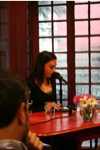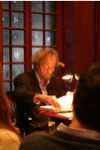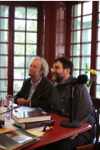Donald Hall
April 16–17, 2007
- Reading: Streaming video, MP3 audio
- Discussion: Streaming video, MP3 audio
- Introduction by Jane Sussman: MP3
- Photos from Hall's visit
- An essay about Hall's visit by Anna Levett
- A blog entry about Hall's visit
- A PennSound podcast about Hall's visit
- See the Kelly Writers House calendar entry for more about this event
- 2007 Fellows seminar notes
Bio

Donald Hall is the current United States Poet Laureate. He has published fifteen books of poetry, most recently White Apples and the Taste of Stone: Selected Poems 1946-2006 (2006); The Painted Bed (2002) and Without: Poems (1998), which was published on the third anniversary of the death from leukemia of his wife, the poet Jane Kenyon. Other collections are The One Day (1988), which won the National Book Critics Circle Award, the Los Angeles Times Book Prize, and a Pulitzer Prize nomination, and The Happy Man (1986), which won the Lenore Marshall Poetry Prize. He has also published children's books, short stories, plays, and several autobiographical works, such as The Best Day The Worst Day: Life with Jane Kenyon (2005) and Life Work (1993), which won the New England Book award for nonfiction. His honors include two Guggenheim fellowships, the Poetry Society of America's Robert Frost Silver medal, and a Lifetime Achievement award from the New Hampshire Writers and Publisher Project. Hall served as Poet Laureate of New Hampshire from 1984 to 1989.
Poet, novelist and critic John Fuller has said of Hall's work, "It is the hardest thing to write poems as simple and celebratory as these, full of love and observation of the commonplace."
PennSound MP3 files
Donald Hall reading, April 16, 2007
- Introduction by Al Filreis (4:24)
- Introduction by Jane Sussman (4:04)
- White Apples and the Taste of Stone (4:50)
- Self-Portrait as a Bear (1:33)
- Ox-Cart Man (2:21)
- Names of Horses (3:08)
- To a Waterfowl (3:06)
- Mr. Wakeville on Interstate 90 (2:44)
- The Routine (0:34)
- Without (5:27)
- Letter With No Address (5:31)
- Weeds and Peonies (2:41)
- Wool Squares (1:22)
- The Wish (1:08)
- Death Work (1:20)
- Distressed Haiku (0:56)
- Affirmation (1:33)
- Witnesses' House (3:01)
- Tennis Ball (1:21)
- Olives (2:56)
Discussion with Donald Hall, April 17, 2007
- on Kearsarge and permanence (6:50)
- on "Dread" and talking about death (3:45)
- reading "Dread" (1:28)
- writing about cancer as a way to transcend cancer (2:49)
- DH's relation to the modernists and how they affected his work (6:32)
- on elegy (2:16)
- on the language of death and euphemisms (3:40)
- on varying free verse line over the length of his career
- on the unconscious work that goes into poems (1:12)
- on his own audacity in relation to writing (3:32)
- on the origins of his earlier dialogue-based poems (2:54)
- on baseball writing (4:14)
- on learning poetry yourself (2:07)
- on his writing process (3:00)
- on the conclusion of Life Work (1:11)
- reading "This Poem" (2:59)
Essay about Hall's visit by Anna Levett
Routine
In the bliss of routine
-coffee, love, pond afternoons, poems-
we feel we will live
forever, until we know we feel it.- Donald Hall
Donald Hall published the poem "Routine" in his book The Old Life, a year after his wife Jane Kenyon's death from leukemia. It speaks to what he describes as his "elegiac syndrome."
"I've really been elegiac all my life as a poet, not just on the occasion of Jane's death," said Hall in his discussion with Al on Tuesday morning. "Part of the impulse toward elegy is the impulse to turn the dead into a mountain, to try to preserve, to try to make it endure in language as it could not endure in flesh."
Reading Hall in class, we were struck by how many of his poems spoke of loss. "To grow old is to lose everything," he writes in his poem, "Affirmation." Even his early work, written when he was closer to us in age, is preoccupied with mortality. In the poem, "My Son My Executioner," he writes of his newborn:
We twenty-five and twenty-two,
Who seemed to live forever,
Observe enduring life in you
And start to die together.
As students in our early 20's, it can be hard to grasp the temporality of things. The Poet Laureate's familiarity with mourning was unsettling.
We noted, however, another Don Hall-"the Don Hall of continuity, of seasons, of renewal," said Al. This was the poet who wrote of baseball, of the permanence of his Mt Kearsarge-"I close/ my eyes, and you rise inside me,/ blue ghost."
Said Hall of that poem, "Mount Kearsarge:" "I take some comfort from the continual endurance of the natural world...There is an external Kearsarge, but an internal Kearsarge as well now. It's an emotional statement of continuity. When my back is turned to Kearsarge or when I am in Philadelphia, I can still see it."
Perhaps this is why Hall also takes comfort from routine. The way routine repeats itself, the way it feels infinite.
It's a tradition for the Fellows class to give each Fellow a gift, and we had trouble deciding what Donald Hall would like. Jamie-Lee suggested that we register to become bone marrow donors, in honor of Jane. We were a bit hesitant at first, pausing to think about what this would mean. But in the end, we were enthusiastic.
And so a week after his visit, our classroom morphed into a bone marrow registration drive. A woman arrived with forms, and we swabbed our cheeks with Q-tips. Now our marrow has been registered as available, should someone need it. In his letter to Al and Jamie-Lee after his visit, Hall wrote, "The bone marrow gift was the best single thing."
12 years after Jane Kenyon's death, Hall is still writing poems. Though he speaks often of Jane, he has a new love in his life-Linda Kunhardt, who came with Hall to the Writers House. His book The Best Day the Worst Day, a prose account of Jane's death, is dedicated to Linda.







